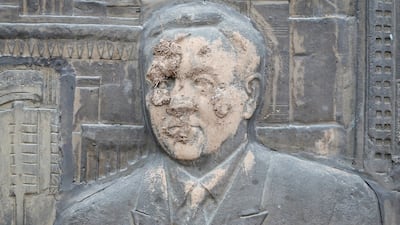A Russian-led military bloc will begin withdrawing its troops from Kazakhstan in two days' time after fulfilling its main mission of stabilising the Central Asian country, Kazakh President Kassym-Jomart Tokayev said on Tuesday.
Addressing the government and parliament in a videoconference call that was broadcast live, Mr Tokayev promised to conduct reforms, rein in inflation and boost wages.
He told MPs he was appointing a veteran public servant, Alikhan Smailov, as prime minister. MPs swiftly voted him in during a session broadcast live on state TV.
Mr Smailov, 49, served as first deputy prime minister in the previous Cabinet, which Mr Tokayev dismissed last week amid violent clashes in the oil-rich country.
The president also ordered the central bank and the financial regulator to ensure foreign exchange market stability to build confidence in Kazakhstan's tenge currency.
Kazakhstan and Russia have framed last week's unrest, which grew out of peaceful protests against an energy price rise, as a coup attempt assisted by foreign “terrorists”, but have provided little evidence to support the claim.
Following a request from Mr Tokayev, the Moscow-led Collective Security Treaty Organisation sent troops to restore order.
On Tuesday, Mr Tokayev announced that what he called “a phased withdrawal” would begin in two days and take “no more than 10 days".
“The main mission of the CSTO peacekeeping forces has been successfully completed,” he said.
Kazakhstan's security forces have detained 9,900 people over the unrest, the Interior Ministry said on Tuesday.
The CSTO mission of more than 2,000 troops was sent at the peak of the crisis last week, after armed clashes between opponents of the government and Kazakhstan's security forces rendered parts of Almaty — the country's largest city — almost unrecognisable.
The decision to send troops as peacekeepers was a first for the CSTO, which is often presented by Moscow as a Nato equivalent. But the organisation has been reluctant to interfere in Central Asia, a region with long historical ties to Russia.
Concern has mounted that Moscow could leverage the mission to shore up its influence in Kazakhstan.
US Secretary of State Antony Blinken warned last week that “once Russians are in your house, it's sometimes very difficult to get them to leave".
The crisis has laid bare infighting at the very top of the Kazakh government.
Mr Tokayev's mentor, founding president Nursultan Nazarbayev, has yet to appear publicly since the unrest began, despite Mr Nazarbayev's aide claiming that the strongman, 81, was in the capital Nur-Sultan and in dialogue with Mr Tokayev.
Former National Security Committee chief Karim Masimov - a key Nazarbayev ally viewed by many as perpetuating the retired president's influence over government - was arrested on Saturday.
Mr Tokayev appeared to have further bolstered his position, backing Mr Smailov to take on the job of prime minister permanently — a nomination that won the unanimous support of legislators on Tuesday.
The president also blamed the committee formerly controlled by Masimov for deserting Kazakhstan's cities during the crisis.
“Despite a sufficient military arsenal, without engaging in battle, they left the buildings, leaving weapons and secret documents there,” Mr Tokayev said, pledging to reform Kazakhstan's security structures to make the “defence of citizens” their top priority.
“A terrorist war was unleashed against our country. The enemy showed extreme cruelty and readiness to take any steps. He sowed fear among the population in order to suppress even the very idea of resistance,” Mr Tokayev said.
“We could have lost the country.”
Many residents of Almaty welcomed the CSTO as a stabilising force after spending several days inside as gunfire echoed across the city.
Roza Matayeva, 45, an English-language teacher, became used to tuning into her radio during a five-day internet power cut in Kazakhstan's financial hub. The power cut ended briefly on Monday morning before the city of 1.8 million went offline again at lunchtime.
It was the news that the Moscow-led bloc had agreed to Mr Tokayev's request to send troops that gave her belief that a corner was being turned.
“That brought relief and hope that the situation will be decided for the best in the near future,” she told AFP.
“I welcome cooperation with Russia. I think there is no threat to our sovereignty.”













